The hills north of Whitecap City were bigger and much more homogenous than I remembered, one hill the same as the next. There were many windows between hills through which you could see glimpses of the sea, many dead tress hanging off the corners of hills, bare limbs reaching out like grasping arms for help. Many little shacks half-rotted from the salty air with chickens pecking the dirt in the yards. After going through one village whose streets I was sure I had run as a child, and then finding another that was just the same, I realized that there was only one village, replicated many times over many hills.
There were not many volshebnik patrols, but there was at least one, which was more than I had seen in the wild before and more than I had hoped to encounter. I spotted them on the road and hid behind the ridge of the hill while they trooped past, four of them in total. They were identifiable by the dark blue patches on their breasts and the way they moved more quickly than was natural while not seeming to exert themselves much at all. Most of them I couldn’t recognize from my distance, but there was one with very distinctive curly hair I knew I had seen before.
They would recognize me. If I recognized even one of those minor cousins, they would all recognize me, and they would certainly tell Aksana, because why should I be here? It was strange that I was here.
It should be plain, in fact, to anyone who saw me that it was strange I was here. I didn’t know why it had taken me seeing a volshebnik patrol to realize this basic truth. My clothes alone, if not enough to mark me as a volshebnik, were enough to make me a target for robbers.
I took my overshirt off and turned it inside out and rubbed dirt all over it—more dirt than had previously existed on it. I didn’t think it helped much. If anything, I just looked crazy in addition to wealthy, which made me stand out even more. And poor people weren’t dirty; they just didn’t wear dyed purple shirts with embroidered sleeves made out of Akassiyan cotton.
I turned the shirt right-side out again and, looking like the dirty rich person I was, headed out to find another town that hadn’t just been—or was soon to be—terrorized by a volshebnik patrol.
The village I came to eventually had been visited by the patrol, but not recently enough that their stink was still in the air. I asked there if there was anyone who knew a woman called Rakhta Ony.
“She in trouble?” an old man hauling water asked, offloading the yoke onto my shoulders when I offered.
“Umf. Do I look like I could get anyone in trouble?”
“Yes. House is just right up here.” He pointed vaguely down the lane.
So my disguise was working exactly as well as anticipated. “She’s not in trouble. Not from me, anyway.” I didn’t know if she’d agree with that statement, but she wasn’t there, so she didn’t get an opinion.
“Then what do you want with her?”
“I need her help.”
“What help does a fancy lad like you need from an old witch?”
“So you do know her?”
“No. My house is just here. You can put the buckets down over there.”
The venture wasn’t a total loss, though. The old man had a spare pair of his dead son’s clothes he was willing to give me in exchange for my tunic. He was eyeing my boots, too, but there was only so far I was willing to go in the name of verisimilitude.
No one in that village admitted to knowing my mother, and no one in the next village did, either. I talked to washerwomen, I talked to shepherds, I talked to village kids who pulled the gold pin I’d forgotten was still in my hair out. I let them keep it, and they told me about a witch who crept in naughty children’s windows at night and stole their toes to bake into pies. No, another said, she kept them on a chain around her neck. No, if you talk back, she pulls your tongue out and uses it for her belt. No—
This argument lasted for a long time, and while I didn’t doubt my mother might threaten any number of those things, none of the children could agree on where the witch lived, anyway.
The children were the most helpful of them. Most people I met looked at me with a skeptical eye, and some of them looked long enough that it spooked me, and some of them asked questions I hadn’t been prescient enough to think up convincing answers to. Once, I offered to pay for information, but the man started leading me down a lonely path, and my hackles started to rise, and I slipped away wordlessly before he could lead me into a trap.
That interaction rattled me, and the number of people who had seen me began to pile up in my head, the volshebnik patrol lurking in my peripheral vision.
This was two days wasted skulking around the backcountry, and if I were going to get out of Khorizova before they noticed I was missing, I needed to go soon. So I headed back south and inland, and then, as the sun was setting in my eyes, I came to a hill on whose corner hung a dead tree, fingers grasping for help, and down that hill, nestled in a little dip between hilltops, there was a house—a shack—surrounded by trees and an empty chicken coop. When I got close, I saw a broken circle of white powder mixed in with the leaves and dirt and grass. There was light flickering in the window.
I stood out there for a long time before I convinced myself to knock on the door. Chances were, this wasn’t even the right shack. It wasn’t any different than the others I’d passed.
At first, no one opened the door. Then, I heard rustling from the window, but by the time I looked, the curtain had come back down. There was shuffling on the other side of the door, then silence.
No one sane would open the door for a stranger in the night.
The door swung open and behind it stood a woman, half a head shorter than I was, with wispy black hair down to her waist, broad cheekbones and dark sunspots on her nose. She stepped up to me, tilting her head up under my face, and sniffed, long and hard. When she exhaled, I smelled blackberry wine. Her eyes were cloudy.
“Mama,” I said. “It’s me. It’s Iyu.”
“I can see that.” She turned from me and shuffled to the long counter on the back wall, where she made her tinctures and tonics and potions. “I’m not blind.”
“You’re not?” I stepped inside and closed the door behind me. The one-room shack seemed shrunken; I felt too big for the space, but herbs still hung, fragrant, from the rafters. The single bed was still where I remembered it, still rumpled and stained.
“Not entirely.” She turned around, cup in her hand.
“It’s just… the eyes.”
“What do you want?”
The question struck me between the eyes. “I—I don’t know. I can go if you’re busy.” I stayed by the door, unsure what to do with my hands, feeling like I was taking up too much space.
“Don’t be stupid, why would I be busy?” She leaned back on the counter and crossed her arms.
“Oh. Well—”
“If you’ve come to do her bidding, you ought to leave before I lose my temper.”
“I haven’t. I’m here because I left.” Humiliating: the pride, the hope in my voice.
“Left? Obviously, you left. This isn’t Whitecap Palace.” She snorted.
“No. I mean, I left. I don't belong to Aksana anymore.”
She blinked, slowly. She seemed so old; surely she was not yet so old she should be going blind. “You’re no longer an Aksanevich?”
I paused. I hadn’t thought of it in those terms before.
She, somehow, swaying drunk and half-blind, sensed my hesitation. “You’re still an Aksanevich.” She waved her arm, splashing wine on the floor. “You can leave.”
“I’m not,” I said, though the better half of me wanted to obey her command. “I’m not an Aksanevich anymore.”
“Since when? Did she kick you out? Were you not good enough, so now you come crawling back here, thinking I’ll take her castoffs?”
“I'm not a castoff. I left of my own free will.” I stood up taller, thinking, how strange: she was small, really. I could pick her up and toss her with one arm.
“Why?”
“Is it important?”
“Yes. I want to know that she hasn’t come to humiliate me again; that this body standing in front of me is not a marionette, a paper doll in her hands.” She was so mad she was spitting.
“I am your son,” I said. “You tried to keep them from taking me; I remember it. I thought you might want to see me again.”
“Yes, I tried to stop them from taking you and for ten years you never came back. Did she keep you in a cage? No. If you wanted to come, you could have.”
“And you could have tried to come get me.”
“Pah!” She laughed harshly. “One old witch against a horde of volshebniks. You’re the volshebnik. You’re the one with all the power.”
“I was a child!” I advanced across the room until we stood toe-to-toe, and part of me was disappointed when she did not shrink away. She’d always been so much bigger than me. I grabbed the jug of wine behind her and poured myself a cup.
She watched me the entire time, the look on her face almost amused. “Why?” she repeated.
With the cup poured, I stepped back and sat at the table, where there were still two chairs. I sat in the one she always had. The other was empty, though the table and floor beside it were piled high with detritus and knick-knacks. I recognized almost all of them. There was a toy I’d had as a child, a seahorse with glass bead eyes, among them.
“It’s a long story,” I said.
“Well, please. Don’t let the fact you’re keeping an old woman up all hours of the night stop you from being thorough.”
“You can’t be that old.”
“Tell your story or don’t,” she snapped.
So I did.
About halfway through, she sat down. Not at the table, but where she stood, back against the counter. The way her body folded into the floor was not the way an old woman’s would, I noticed, with some sense of triumph.
When I got to the part where Antosha died, she wrapped her arms around her knees and buried her head in them like a child. I thought she was going to sleep at first, but when I trailed off, she muttered, “Keep going.”
When I got to our tour of Khorizova and Liza’s body hung on the pole, she made a sound somewhere between a sob and a laugh.
But when I started talking about Gorakino, zhiva, gnila, explaining the emetic, she raised her head. Her face was swollen as she watched me, chin resting on her knees, but her eyes were suddenly clear.
As I finished talking, she got up, tiptoed over as though creeping up on me, and stood there. When I was done, she kept staring down at me with clear eyes, seeming somehow taller, hair suddenly bursting from the braid at her back.
She threw herself down at my feet, wrapping her arms around my waist.
“My boy,” she said, voice muffled by the fabric of my trousers. “My good boy. Yuyu, you’re really back.” She lifted her head, and I felt her tears on my pant leg as she smiled up at me.
Her smile shifted and her brow furrowed. “Did that bitch really whip you?” She jumped to her feet and danced around me, pulling at my shirt.
“Mama, it’s all healed now,” I said, hunched over with my shirt bunched up around my shoulders, but even as I protested, there was something giddy in doing it, in saying “Mama” and telling Mama not to fuss over me.
“Nonsense, nonsense,” she said, sliding her fingernail against the ridge of a long scar. Then she was gone from my side, and her voice came from across the room, at her counter. “Take off your shirt; go lie down on your stomach.”
Her pillow smelled like her wine and her sweat, a smell so deeply familiar I never even knew it was in my nose all the time until I got a full throat of it now. I closed my eyes while Mama rubbed something cool and gritty on my back, and I was glad I was lying down because I suddenly felt weak and small.
Mama was chattering while she worked, but I wasn’t really listening, and I doubted she was really saying anything. I remembered when I was little enough to curl up in a corner of this small, sweat-soaked bed and sleep without even touching Mama. Sometimes I’d wake up with her fist knotted in my clothes as if she were trying to keep me from floating away. Now, I took up the entire bed myself, and I was not a terribly big man. Semchik’s shoulders would probably hang off the sides of the thin mattress.
Without me noticing it, Mama had stopped rubbing ointment on my back and started stroking my hair, her chattering turned to humming, occasionally murmuring a pattern of, “my boy, my Yuyu, my boy is home.”
I should have gotten up; I should have known better, but. Her hands were rough but they were tender, her voice was rough but it was tender, she touched me like I was something fragile and precious, and I fell asleep like that, pushing down the heavy knot that kept struggling to form in my chest.

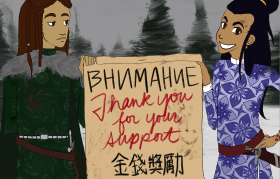
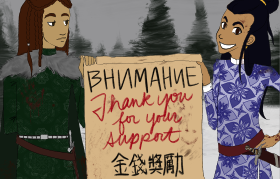
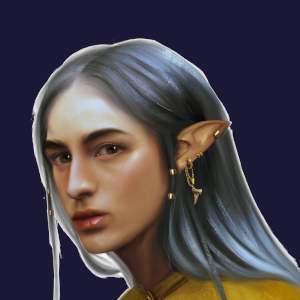








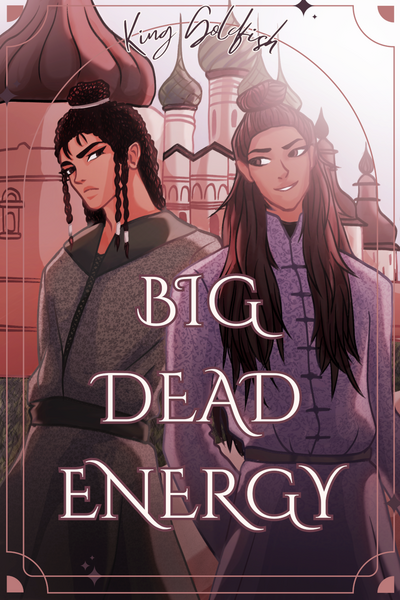
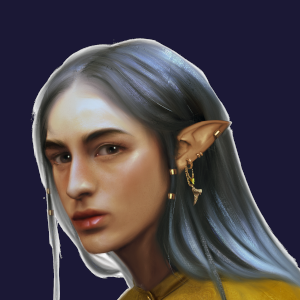
Comments (2)
See all